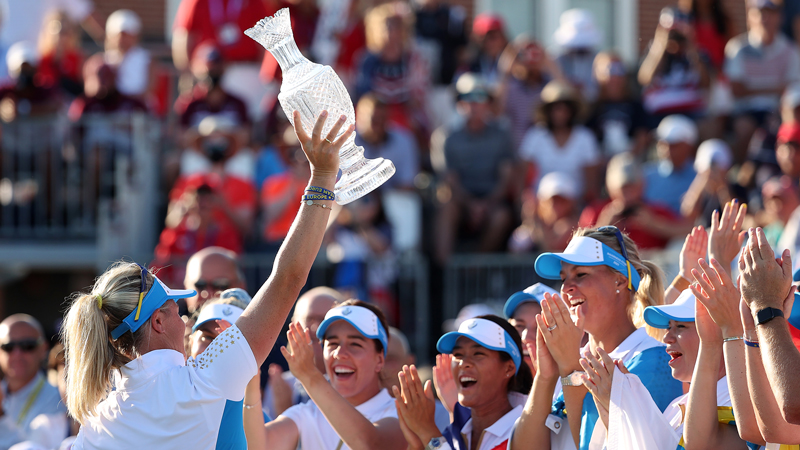Why Scintillating Solheim Emphasised FedEx Cup Flop
The thrilling last day of the Solheim Cup showed up the fizz-free finale in the FedEx Cup


Subscribe to the Golf Monthly newsletter to stay up to date with all the latest tour news, equipment news, reviews, head-to-heads and buyer’s guides from our team of experienced experts.
You are now subscribed
Your newsletter sign-up was successful
Want to add more newsletters?

Delivered daily
Daily Newsletter
Sign up for all the latest tour news, gear reviews, head-to-heads and buyer’s guides plus features, tips from our top 50 coaches and rules advice from our expert team.

Once a week
Kick Point
Sign up to our free Kick Point newsletter, filled with the latest gear reviews and expert advice as well as the best deals we spot each week.

Once a week
Women's Golf Edit
Sign up to our free newsletter, filled with news, features, tips and best buys surrounding the world of women’s golf. If you’re a female golfer, you won’t want to miss out!
Europe’s thrilling victory in the Solheim Cup provided quite a contrast to the fizz-free finale in the previous day’s FedEx Cup
Why Scintillating Solheim Emphasised FedEx Cup Flop
The Solheim Cup at the Inverness Club in Ohio delivered everything you could hope for from a top-level golf event.
Exceptional play, drama and controversy, breakout performances, comebacks and a finish that went, very nearly, right to the wire.
Team events generally tend to showcase the best elements of elite competition but, in the last couple of instalments, the Solheim Cup has really raised the bar.
After Pettersen’s final putt finish in Gleneagles, the way the Europeans held their nerve to edge the matches in Toledo provided compelling viewing.
I was captivated by the action throughout the weekend and the afternoon (our evening) of Labor Day Monday.
Subscribe to the Golf Monthly newsletter to stay up to date with all the latest tour news, equipment news, reviews, head-to-heads and buyer’s guides from our team of experienced experts.
Following the brilliant Women’s Open Championship at Carnoustie, this was another great event for the women’s professional game, demonstrating the incredible levels of precision and mental strength the best players can produce under the most intense scrutiny.
Perhaps more important than an exhibition of skill though, was how much entertainment the Solheim Cup delivered.
In that regard, as far as I’m concerned it wiped the floor with the other significant event taking place over the weekend: the denouement of the FedEx Cup and the Tour Championship at East Lake.
Yes, that was a close-run thing with Patrick Cantlay sneaking it by a shot from Jon Rahm and, yes, he did it with a birdie at the last.
But when he holed out for that birdie, his understated reaction said it all – A man who had just won $15 million quietly raised his cap and offered a hint of a smile.
The event was such that even the winner couldn’t get particularly excited.
In fact, Cantlay went as far as to say that he doesn’t like the format of the event that netted him such a huge financial prize.
A principal problem with it, as he and so many other see it, is that the lowest score of the week doesn’t win the Tour Championship.
Cantlay started on 10-under par at East Lake and without that head start would have ended the week in tied fourth.
The current format of the FedEx Cup playoffs relies on the huge financial rewards to deliver the excitement.
I’m supposed to ooh and aah at the prospect of the winner netting $15 million.
I’m not that bothered – these guys all have enough money that another huge cheque is of no consequence to them or to the spectators.
In fact, if anything, I think most watching just feel it’s a bit gratuitous and unnecessary.
What I want to watch as a golf fan is nail biting, passionate and determined competitive action… Like we saw at the Solheim Cup.
In individual golf, we see it at the Majors – compare Jon Rahm’s reaction to his winning putt at the U.S. Open with Cantlay’s at East Lake. Which appeared to mean more?
The fact the Tour Championship finale played out at the same time as the action was really starting to fizz in the Solheim Cup served to highlight the lack of buzz around the final FedEx Cup event.
Related: How the world of golf got it so wrong
To make it stand out, a different format is required for the conclusion of the FedEx Cup – A return to the old system that rewarded the season-long winner and allowed the best player at East Lake to take Tour Championship glory would be a starter for 10.
The PGA Tour has some thinking to do after this weekend.
It was a tough gig to go up against the Solheim Cup but the relative levels of excitement surrounding each tournament should act as a wake-up call that a change is required.
The grit and exuberance displayed by both sides in the Solheim Cup at Inverness will live long in my memory. Patrick Cantlay’s $15 million tap-in and casual cap raise will probably not.

Fergus is Golf Monthly's resident expert on the history of the game and has written extensively on that subject. He has also worked with Golf Monthly to produce a podcast series. Called 18 Majors: The Golf History Show it offers new and in-depth perspectives on some of the most important moments in golf's long history. You can find all the details about it here.
He is a golf obsessive and 1-handicapper. Growing up in the North East of Scotland, golf runs through his veins and his passion for the sport was bolstered during his time at St Andrews university studying history. He went on to earn a post graduate diploma from the London School of Journalism. Fergus has worked for Golf Monthly since 2004 and has written two books on the game; "Great Golf Debates" together with Jezz Ellwood of Golf Monthly and the history section of "The Ultimate Golf Book" together with Neil Tappin , also of Golf Monthly.
Fergus once shanked a ball from just over Granny Clark's Wynd on the 18th of the Old Course that struck the St Andrews Golf Club and rebounded into the Valley of Sin, from where he saved par. Who says there's no golfing god?